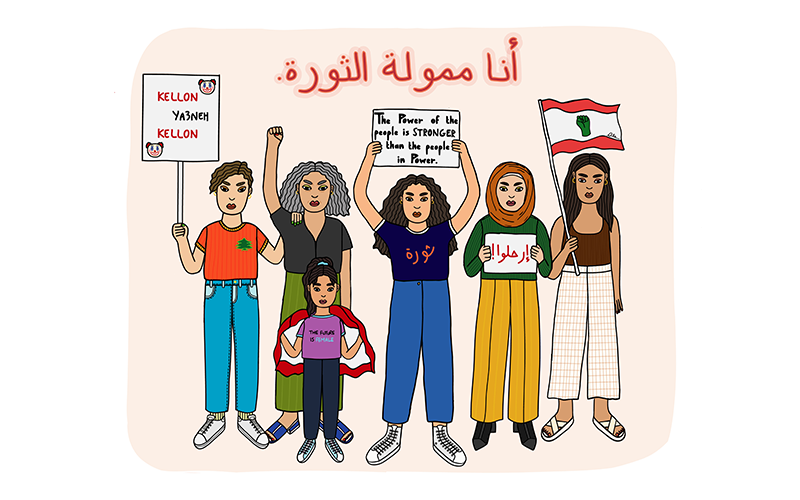I am human. I am distraught, disorganized, and disillusioned. I can barely attenuate how exhausting and disorienting this week was into coherent words. On Friday, it was my birthday. My friends and I hosted a potluck on Sunday. The long weekend ended with a pleasant dinner at my roommate’s family’s house in west Quebec. Over 100 forest fires took ablaze the following days.
There is no transition. I am engulfed by a demanding sadness. I close my laptop for an hour. Then there is revolution. Revolution smells like rubbing sunscreen into the rotting stench of trash in the heat. It smells like accumulated sweat because there isn’t enough electricity to turn on the AC. Revolution smells like a burnt valley. It reeks like the McLennan midterm feet-stink that I sit in as I pretend to preoccupy myself with miscellaneous tasks in an attempt to disentangle my thoughts from the knots on social media.
Lebanon began a collective march on Oct. 17. Over one million people are currently protesting the Lebanese government. These chants ring out from a multitude of districts, across religious sectarian divides, and political spheres. They demand those in office to resign. The Lebanese government functions as a confessionalism system; this means that they proportionally represent the religious distribution of the country. The Lebanese people have, for the first time in history, let go of all sectarian and religious divides to fight for a better living standard. The Western media coverage has done this revolution no justice.
The country is drowning in a debt pool created by stealing and conniving criminals who have spent years pulling at the very last heartstrings of the vulnerable. We do not have clean drinking water. We do not have full-time electricity. We do not have basic public services like adequate firefighting fleets. Many parents find it difficult to fund their children’s education. Admirably, the Lebanese people have yet to stop dancing, singing, and supporting one another throughout the revolt. This revolution is an example of tenacity and luminosity that should be internationally esteemed.
Sahat El-Nour is found in the centre of Tripoli, where a large amount of the population is unemployed. The city has a reputation for being dangerous and hostile, but I believe the country’s social structure is currently undergoing rapid, drastic change. Last Saturday, the mass crowd with a bad reputation demonstrated this change as they danced in numbers reaching the thousands as DJ Madi Karimeh vamped techno beats. I cannot stress this enough: I would much rather be there.
Last week, I walked home from Montreal’s protest in solidarity with Lebanon by myself. Hope taunts, and sometimes, hope hurts. I wondered what people on the street expected me to be crying about. I want so badly for this to keep going well: I want to go home to Lebanon. I graduate this December and have spent five and a half years separated from my family by country lines. I have missed too many of my younger brother’s birthdays, and now, he is a foot taller than me. I am tired, but, I have never been so hopeful for my country. My mom sent me a video of her at the protest in Tripoli; she is screaming at the top of her lungs to a chant with a crowd of thousands of voices; she stops for a second, turns to the camera and says “Hanouna, you are my heart.”
I am human; I am distraught, disorganized, and disillusioned. I will not regurgitate the history of Lebanon. Here is my dream the revolution has finally given me hope for. As an international student, watching the news is checking up on my family; I have to process, mourn, and resist on a foreign campus, two-plane rides from home.
Last summer, some friends from United World Colleges Dilijan and I gathered for the first time in two years. After high school, each of us had gone to separate corners of the world that promised us opportunity. Sipping coffee on a Beirut balcony, my friend says, “One day, we’ll be grown old, and you’ll be home here in a free Beirut and I’ll be in mine in a free Syria. We’ll visit each other, just a 30-minute drive away.”







